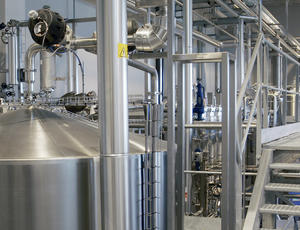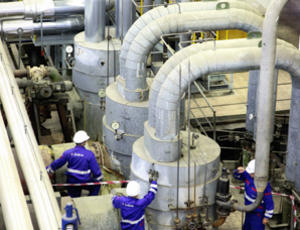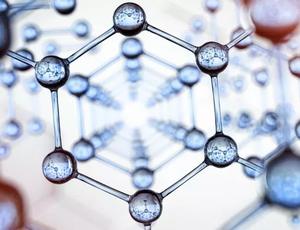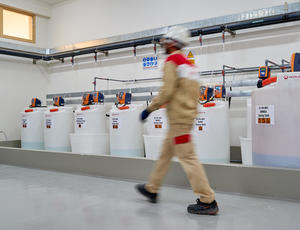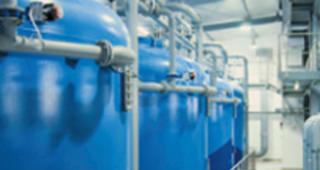Short cycle regeneration ion exchange deionizers for high-purity water production.
Overview
Rapide Strata is a skid-mounted and pre-commissioned resin bed water deionizer that removes all the dissolved salts from water in a single process that combines both Veolia Water Technologies’ short cycle deionization technology and an innovative pulse regeneration sequence.
The system consists of two or three beds (glass-reinforced plastic pressure vessels) holding the ion exchange resins, together with a process pump, pipework, valves, flowmeters and controls. This enables the production of continuous high-quality deionized water and the automatic regeneration of the resins when required. The components are all mounted on a compact steel framework, coated for corrosion resistance.
How Rapide Strata works
The raw water is first conditioned, usually using reverse osmosis membranes or nanofiltration, to remove organic matter and other contaminants. Next, clean water enters the Rapide Strata deionization system and flows through ion exchange resins, small and porous plastic beads offering a large surface area to exchange the ions present in the water; some are positively charged (cations) and the others negatively charged (anions). The positively charged resins attract and trap negative anions (chloride, sulfate, nitrate, carbonates, etc.), while the negatively charged resins attract and trap positive cations (calcium, magnesium, iron, manganese, etc.) resulting in highly purified water.
Once the resins are saturated and have exhausted their exchange capacity, they are regenerated in a chemical solution based on acid and caustic soda. This regenerating solution eliminates the accumulated ions and reactivates the resins.

Features and benefits

Skid-mounted, fully standardized system: short lead time and quick installation and start-up.

Small footprint.

High treated water quality.

Maximized efficiency with short cycle regeneration in 30 to -60 minutes: minimizes downtime, enhances bacterial control and improves chemical efficiency.

PLC control system, HMI touch screen, and Veolia’s Hubgrade digital solutions facilitate monitoring and operation.

Duplex operation mode for continuous water production: increased production capacity.
Applications
Services
Local aftermarket services and support teams offer preventive and corrective maintenance programs to ensure long-term, efficient operation of installed equipment. In addition, we store a wide variety of equipment, instrumentation, spare parts and consumables to ensure we can maintain your critical water and wastewater treatment systems.
Resources & Product range
To best meet your needs, the Rapide Strata range includes seven standard models with capacities ranging from 2.5 to 60 cubic meters per hour (m3/hr).
- Rapide Strata SF series is specially designed for small flow rates: 4, 10 and 18, 4+, 10+ and 18+ m3/hr
- Rapide Strata HF series is dedicated for high flow rates: 23, 32, 45 and 60, 23+, 32+, 45+ and 60+ m3/hr
Contact
Although ion exchange technology has been developed for many years (since 1858), it continues to be a very good option to eliminate undesirable minerals in water, as a selective way.
There is no doubt that the integration of resin technologies into an automated operation control system of the complete ion exchange cycle (Service-Regeneration-Service) makes the Rapide Strata a unique product in the world.
The Rapide Strata’s operational and control design ensures the best possible efficiency in the use of chemicals for regeneration. In addition, its control system supported by a Programmable Logic Controller maintains a very constant water quality during the service stage.
Finally, in view of the global trend towards regulating pollutant ions in water, the maturity of Strata's Rapid proven technology makes it an suitable solution for the future of selective removal of minerals from water.

Antonio Fonseca
Sales Manager - Veolia Water Technologies Mexico
Contact Antonio through is LinkedIn account
FAQ about Rapide Strata™
What is deionized water?
Minerals such as magnesium, sodium or potassium ions are present in various concentrations as dissolved salts in natural waters. Deionized water is water that has been stripped of most of its ions through the principle of ion exchange, making it highly pure water.
What types of resins are used in the ion-exchange deionizers?
The ion exchange resins used to produce deionized water can be classified into two groups: cation exchange resins, which exchange positive ions, and anion exchange resins, which exchange negative ions. Both of these types of resins are small beads of porous plastic, the only difference between them is they target different minerals to remove.
What purposes does deionized water serve in the pharmaceutical sector?
Since deionized water is chemically pure following the removal of all ions, it is perfect for pharmaceutical applications that call for water to be free of contaminants. For example, deionized water is used to clean and/or sanitize manufacturing systems, helping to maintain reliable and safe product integrity results.
Case Studies

Rapide Strata™ stands out to be the best solution for Nestlé Purina in Brazil which needed a demineralization plant for boiler feed water treatment for their new food factory for pet care food.

An institution dedicated to health in the Republic of Costa Rica needed to acquire a new water equipment capable of generating regulated water for injection (WFI) grade ultrapure water by USP to meet the demand of all the Costa Rican territory, in pharmaceutical products for injectable drugs for human use.

A leading manufacturer and supplier of roundwood and treated outdoor timber products in New Zealand implemented Veolia's Rapide Strata™ technology in order to produce demineralized water to feed their boiler on a wood production and treatment facility.



